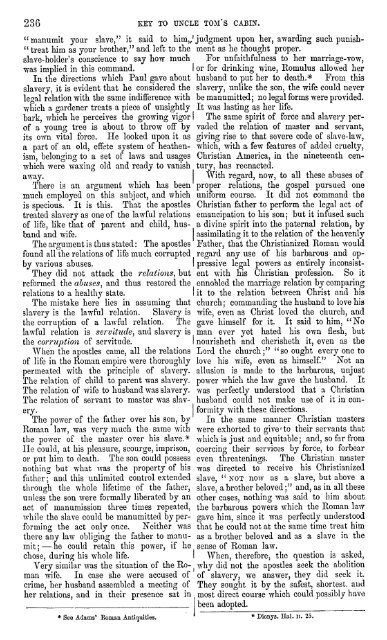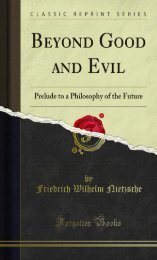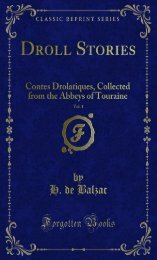UNCLE TOM'S CABIN
1iw97FV
1iw97FV
- No tags were found...
You also want an ePaper? Increase the reach of your titles
YUMPU automatically turns print PDFs into web optimized ePapers that Google loves.
236 KEY TO <strong>UNCLE</strong> TOM S <strong>CABIN</strong>.<br />
"<br />
"manumit your slave,"it said to him,, judgmentupon her,awardingsuch punishment<br />
"<br />
treat him as<br />
your brother," and leftto the<br />
as he thoughtproper.<br />
slave-holder'sconscienceto say how much For unfaithfulness to her marriage-vow,<br />
was implied in thiscommand.<br />
or for drinkingwine,Romulus allowed her<br />
In the directions which Paul gave about husband to put her to death.* From this<br />
slavery, itis evidentthat he consideredthe slavery, son, the wife could never<br />
legal relationwith the same indifferencewith be manumitted; no legal forms were provided.<br />
which a gardener treats a piece of unsightly It was lasting<br />
her life.<br />
bark,which he perceives growingvigor The same spirit slavery pervaded<br />
of a young tree is about to throw off by the relationof master and servant,<br />
its own vitalforce. He looked upon it as giving rise to that severe code of slave-law,<br />
a part of an old,effetesystemof heathenism,<br />
which,with a few featuresof added cruelty,<br />
belonging usages ChristianAmerica,in the nineteenth century,<br />
which were waxing old and readyto vanish has reenacted.<br />
away.<br />
With regard, now, to all theseabuses of<br />
There is an argument which has been proper relations, the gospelpursuedone<br />
much employed on this subject, and which uniform course. It did not command the<br />
is specious Ịt is this. That the apostles Christian fatherto performthe legalact of<br />
treatedslavery of the lawful relations emancipation to his son ;<br />
but it infused such<br />
of life, like that of parent and child, husband<br />
a divinespirit paternalrelation, by<br />
and wife.<br />
assimilating itto the relationof the heavenly<br />
The argumentisthus stated: The apostles Fatherțhat the ChristianizedRoman would<br />
found allthe relationsof lifemuch corrupted regard any use of his barbarous and oppressive<br />
by various abuses.<br />
legalpowers as entirely They did not attack the relations, but with his Christian profession. So it<br />
reformed the abuses,and thus restoredthe ennobled the marriagerelationbycomparing<br />
relationsto a healthystate.<br />
it to the relationbetween Christ and his<br />
The mistake here lies in assuming that church ; commandingthe husband to love his<br />
slavery lawful relation. Slavery is wife,even as Christ loved the church,and<br />
the corruption of a lawful relation. The gave himself for it. It said to him, "No<br />
lawful relation is servitude, slavery man ever<br />
yet hated his own flesh,but<br />
the corruptionof servitude.<br />
nourisheth and cherisheth it,even as the<br />
When the apostles came, all the relations Lord the church; "so oughtevery<br />
one to<br />
of lifein the Roman empirewere thoroughly love his wife,even as himself." Not an<br />
permeatedwith the principle slavery. allusion is made to the barbarous,unjust<br />
The relationof child to parentwas slavery. power which the law gave the husband. It<br />
The relationof wife to husband was slavery. was perfectly understood that a Christian<br />
The relationof servant to master was slavery.<br />
husband could not make use of itin conformity<br />
with these directions.<br />
The power of the father over his son, by In the same manner Christianmasters<br />
Roman law,was very much the same with were exhorted to give 'to theirservants that<br />
the power of the master over his slave.* which isjust and equitable; and,so far from<br />
He could,at his pleasure, scourge,imprison, coercing their services by forcețo forbear<br />
or put him to death. The son could possess even threatenings. Christian master<br />
nothing but what was the propertyof his was directed to receive his Christianized<br />
father ; and this unlimited control extended slave, " not now as a slave,but above a<br />
throughthe whole lifetime of the father, slave, a brotherbeloved;"and,as in allthese<br />
unless the son were formally by an other cases, nothingwas said to him about<br />
act of manumission three times repeated, the barbarous powers which the Roman law<br />
while the slave could be manumitted byperforming<br />
gave him,sinceit was perfectly understood<br />
the act onlyonce. Neither was that he could not at the same time treat him<br />
there any law obliging the father to manumit<br />
as a brother beloved and as a slave in the<br />
; he could retain this power, if he sense of Roman law.<br />
chose,duringhis whole life.<br />
When, therefore,<br />
question is asked,<br />
Verysimilar was the situationof the Roman<br />
why did not the apostles seek the abolition<br />
wife. In case she were accused of of slavery, we answer, theydid seek it.<br />
crime,her husband assembled a meeting of They sought it by the safest, shortest,and<br />
her relations, and in their presence<br />
sat in most direct course which could possibly have<br />
been adopted.<br />
*<br />
See Adams' Roman Antiquities.<br />
*<br />
Dionys. Hal. n. 25.




